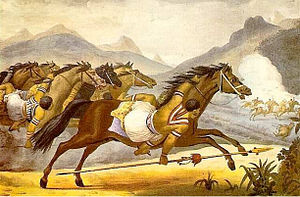 Debret's depiction of the Guaycuru cavalry during an attack | |
| Regions with significant populations | |
|---|---|
| Languages | |
| Guaicuruan languages | |
| Religion | |
| Animism | |
| Related ethnic groups | |
| Guarani |

Guaycuru or Guaykuru is a generic term for several ethnic groups indigenous to the Gran Chaco region of South America, speaking related Guaicuruan languages. In the 16th century, the time of first contact with Spanish explorers and colonists, the Guaycuru people lived in the present-day countries of Argentina (north of Santa Fe Province), Paraguay, Bolivia, and Brazil (south of Corumbá).[1]
The name is written guaycurú or guaicurú in Spanish (plural guaycurúes or guaicurúes), and guaicuru in Portuguese (plural guaicurus). It was originally an offensive epithet given to the Mbayá people of Paraguay by the Guarani, meaning "savage" or "barbarian", which later was extended to the whole group. It has also been used in the past to include other peoples of the Chaco region, but is now restricted to those speaking a Guaicuruan language.
First encountered by the Spanish in the 16th century, the Guaycuru peoples strongly resisted Spanish control and the efforts of Catholic missionaries to Christianize them. They were not fully pacified until the early 20th century.